Research Proposal: Analyzing Cultural Intelligence in the Workplace
VerifiedAdded on 2023/01/05
|9
|2590
|77
Report
AI Summary
This report presents a research proposal focused on analyzing cultural intelligence in the workplace, particularly within organizations like Tesco. The proposal introduces cultural intelligence as a crucial aspect of modern business, emphasizing its impact on employee tolerance, ethical standards, and innovation. It outlines the research aims, objectives, and research questions, aiming to evaluate the impact of cultural intelligence on the workforce. The proposal includes a literature review examining existing research on cultural intelligence, its importance, and the challenges associated with its implementation. The research methodology is described, including the research type, philosophy, approach, sampling methods, and data collection techniques. The proposal also addresses ethical considerations, validity, and reliability to ensure a robust and ethical research process. The conclusion summarizes the key findings and implications of the research, highlighting the significance of cultural intelligence in fostering diversity and innovation within organizations.
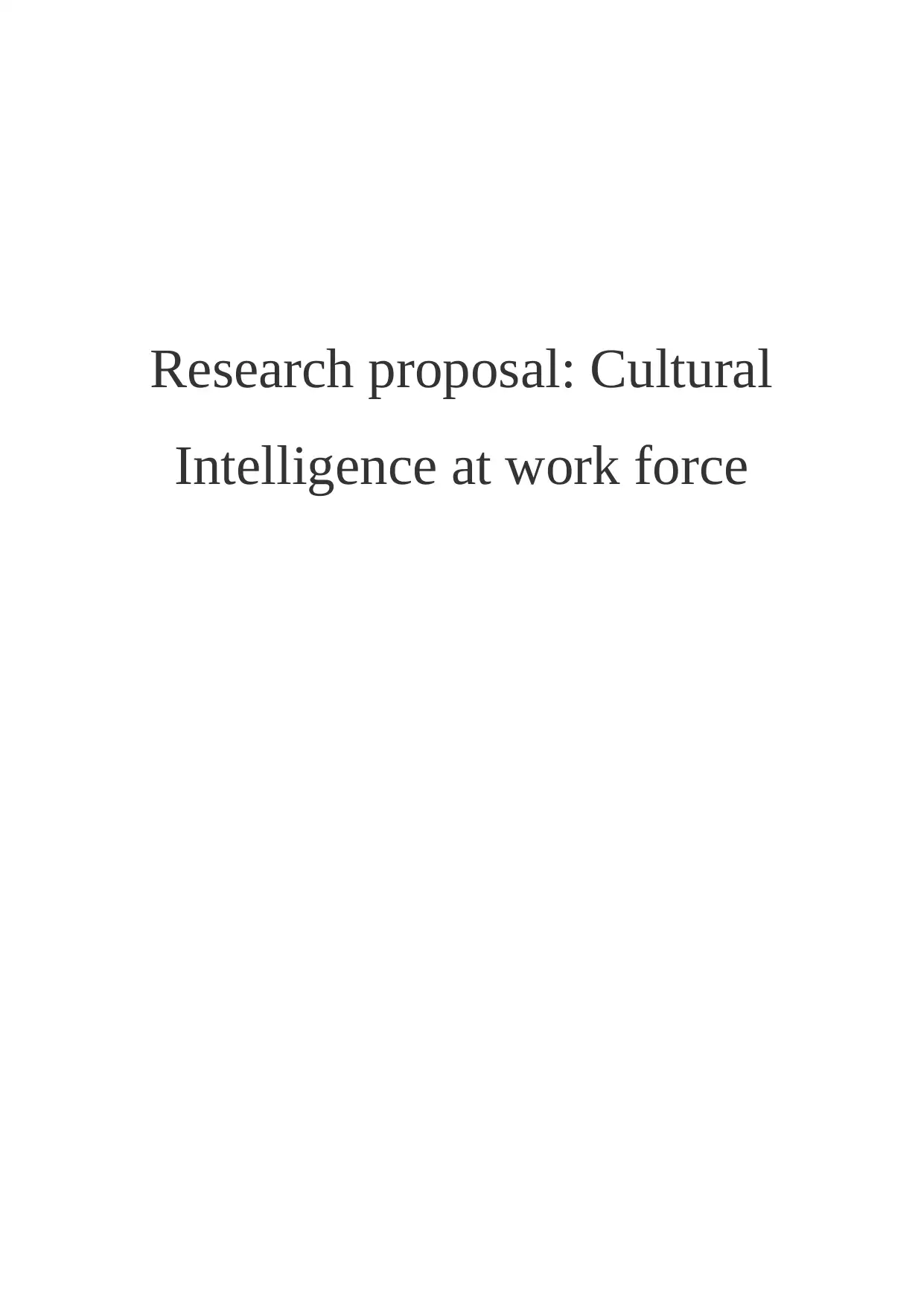
Research proposal: Cultural
Intelligence at work force
Intelligence at work force
Paraphrase This Document
Need a fresh take? Get an instant paraphrase of this document with our AI Paraphraser
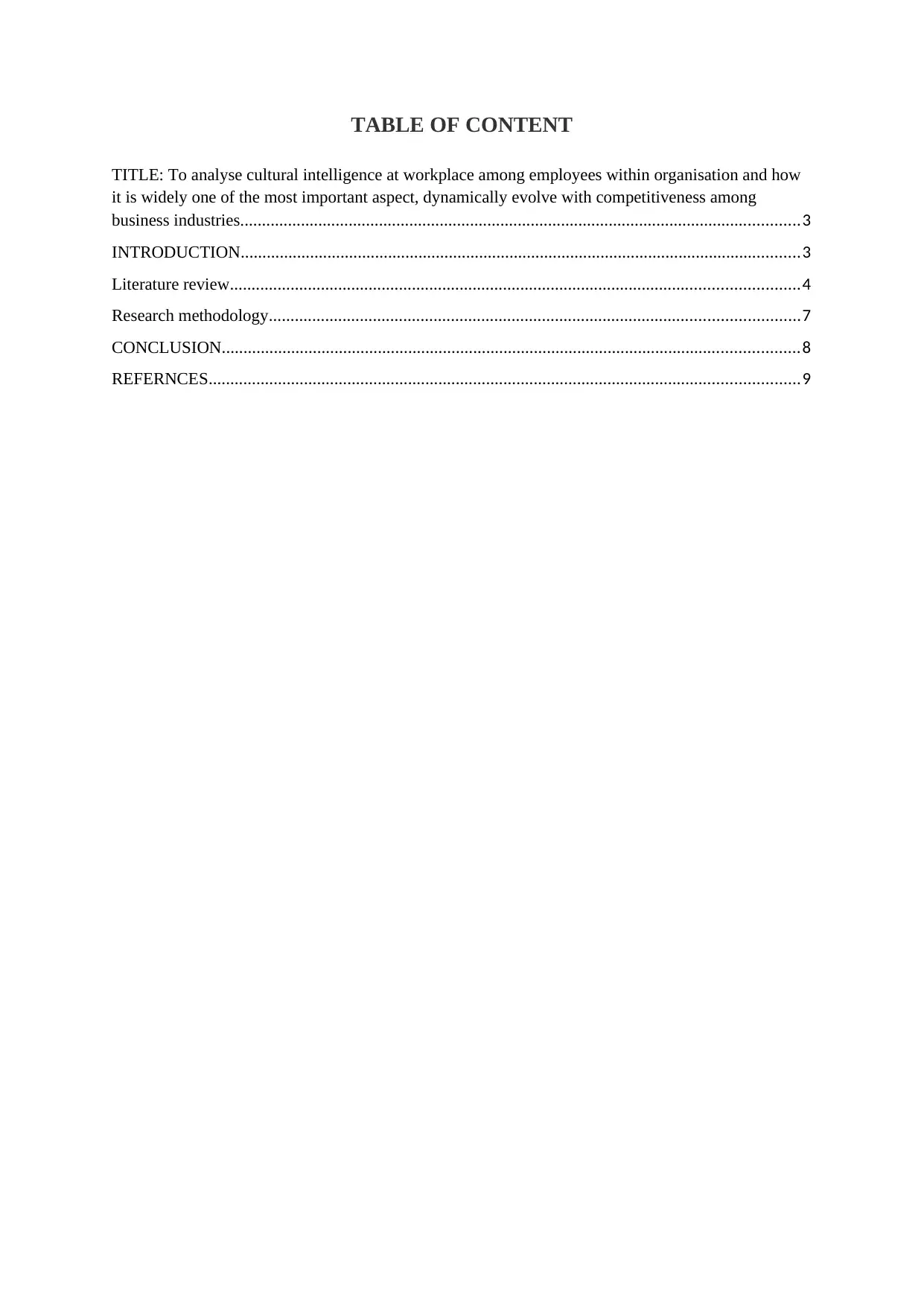
TABLE OF CONTENT
TITLE: To analyse cultural intelligence at workplace among employees within organisation and how
it is widely one of the most important aspect, dynamically evolve with competitiveness among
business industries.................................................................................................................................3
INTRODUCTION.................................................................................................................................3
Literature review...................................................................................................................................4
Research methodology..........................................................................................................................7
CONCLUSION.....................................................................................................................................8
REFERNCES........................................................................................................................................9
TITLE: To analyse cultural intelligence at workplace among employees within organisation and how
it is widely one of the most important aspect, dynamically evolve with competitiveness among
business industries.................................................................................................................................3
INTRODUCTION.................................................................................................................................3
Literature review...................................................................................................................................4
Research methodology..........................................................................................................................7
CONCLUSION.....................................................................................................................................8
REFERNCES........................................................................................................................................9
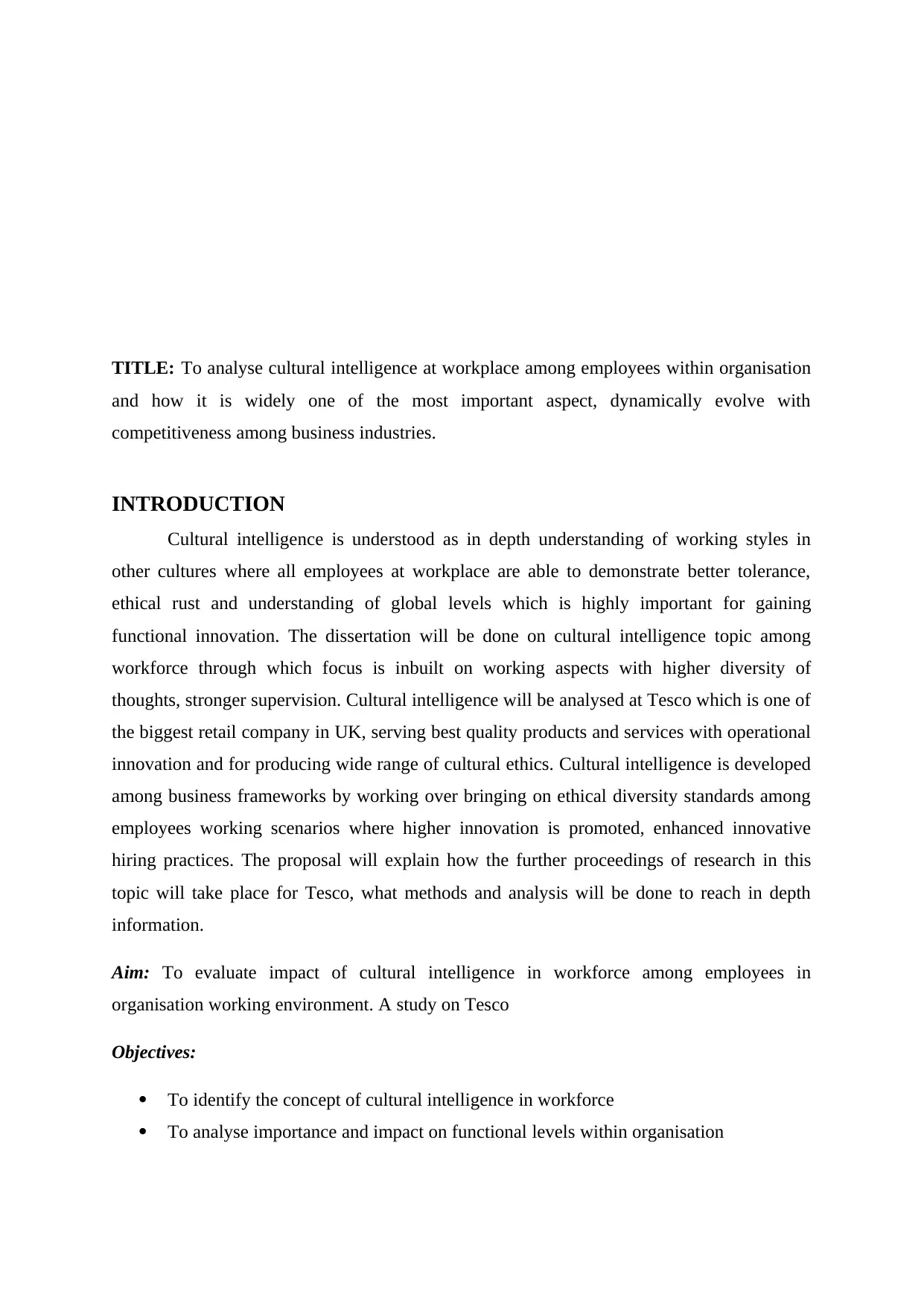
TITLE: To analyse cultural intelligence at workplace among employees within organisation
and how it is widely one of the most important aspect, dynamically evolve with
competitiveness among business industries.
INTRODUCTION
Cultural intelligence is understood as in depth understanding of working styles in
other cultures where all employees at workplace are able to demonstrate better tolerance,
ethical rust and understanding of global levels which is highly important for gaining
functional innovation. The dissertation will be done on cultural intelligence topic among
workforce through which focus is inbuilt on working aspects with higher diversity of
thoughts, stronger supervision. Cultural intelligence will be analysed at Tesco which is one of
the biggest retail company in UK, serving best quality products and services with operational
innovation and for producing wide range of cultural ethics. Cultural intelligence is developed
among business frameworks by working over bringing on ethical diversity standards among
employees working scenarios where higher innovation is promoted, enhanced innovative
hiring practices. The proposal will explain how the further proceedings of research in this
topic will take place for Tesco, what methods and analysis will be done to reach in depth
information.
Aim: To evaluate impact of cultural intelligence in workforce among employees in
organisation working environment. A study on Tesco
Objectives:
To identify the concept of cultural intelligence in workforce
To analyse importance and impact on functional levels within organisation
and how it is widely one of the most important aspect, dynamically evolve with
competitiveness among business industries.
INTRODUCTION
Cultural intelligence is understood as in depth understanding of working styles in
other cultures where all employees at workplace are able to demonstrate better tolerance,
ethical rust and understanding of global levels which is highly important for gaining
functional innovation. The dissertation will be done on cultural intelligence topic among
workforce through which focus is inbuilt on working aspects with higher diversity of
thoughts, stronger supervision. Cultural intelligence will be analysed at Tesco which is one of
the biggest retail company in UK, serving best quality products and services with operational
innovation and for producing wide range of cultural ethics. Cultural intelligence is developed
among business frameworks by working over bringing on ethical diversity standards among
employees working scenarios where higher innovation is promoted, enhanced innovative
hiring practices. The proposal will explain how the further proceedings of research in this
topic will take place for Tesco, what methods and analysis will be done to reach in depth
information.
Aim: To evaluate impact of cultural intelligence in workforce among employees in
organisation working environment. A study on Tesco
Objectives:
To identify the concept of cultural intelligence in workforce
To analyse importance and impact on functional levels within organisation
⊘ This is a preview!⊘
Do you want full access?
Subscribe today to unlock all pages.

Trusted by 1+ million students worldwide
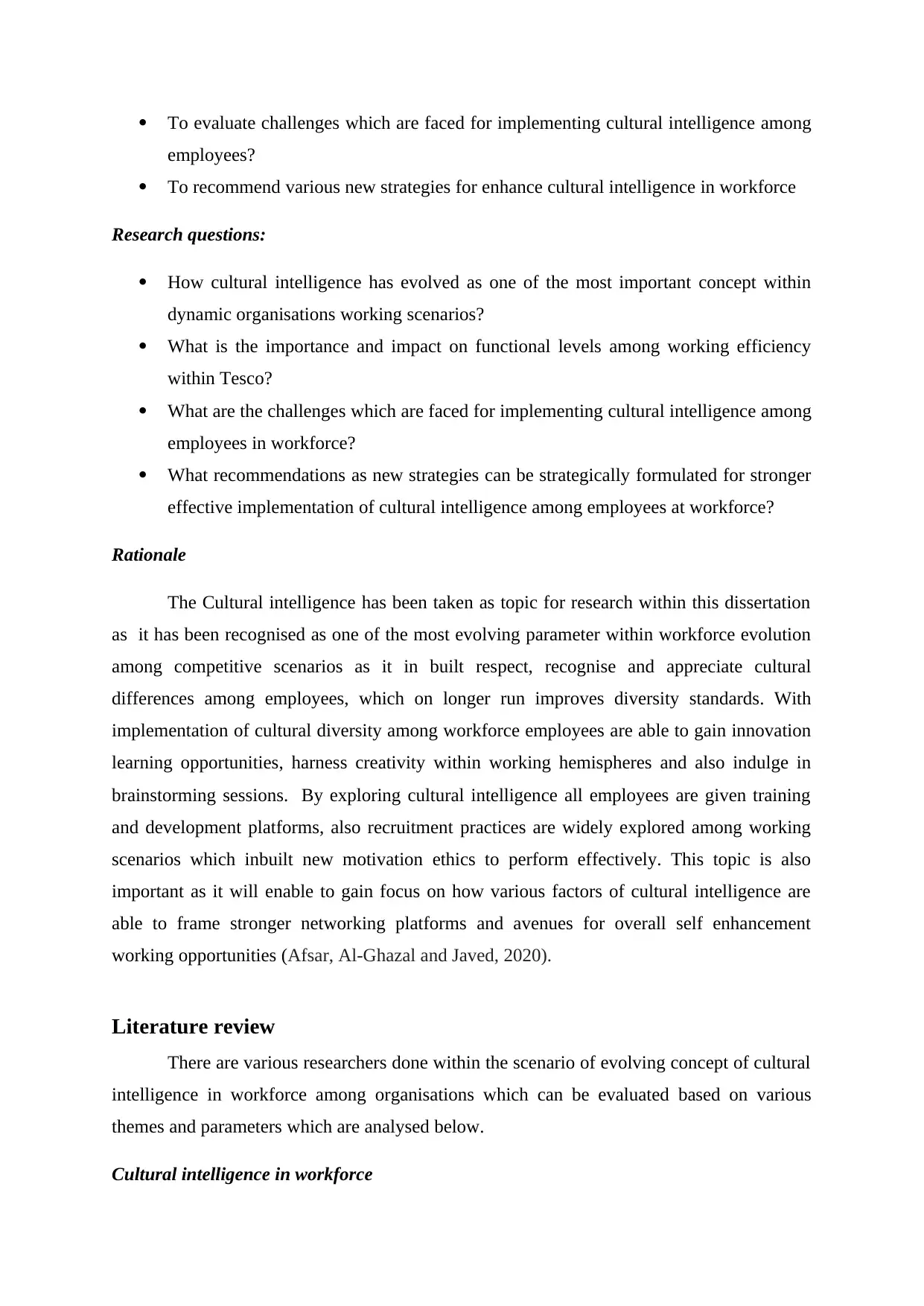
To evaluate challenges which are faced for implementing cultural intelligence among
employees?
To recommend various new strategies for enhance cultural intelligence in workforce
Research questions:
How cultural intelligence has evolved as one of the most important concept within
dynamic organisations working scenarios?
What is the importance and impact on functional levels among working efficiency
within Tesco?
What are the challenges which are faced for implementing cultural intelligence among
employees in workforce?
What recommendations as new strategies can be strategically formulated for stronger
effective implementation of cultural intelligence among employees at workforce?
Rationale
The Cultural intelligence has been taken as topic for research within this dissertation
as it has been recognised as one of the most evolving parameter within workforce evolution
among competitive scenarios as it in built respect, recognise and appreciate cultural
differences among employees, which on longer run improves diversity standards. With
implementation of cultural diversity among workforce employees are able to gain innovation
learning opportunities, harness creativity within working hemispheres and also indulge in
brainstorming sessions. By exploring cultural intelligence all employees are given training
and development platforms, also recruitment practices are widely explored among working
scenarios which inbuilt new motivation ethics to perform effectively. This topic is also
important as it will enable to gain focus on how various factors of cultural intelligence are
able to frame stronger networking platforms and avenues for overall self enhancement
working opportunities (Afsar, Al-Ghazal and Javed, 2020).
Literature review
There are various researchers done within the scenario of evolving concept of cultural
intelligence in workforce among organisations which can be evaluated based on various
themes and parameters which are analysed below.
Cultural intelligence in workforce
employees?
To recommend various new strategies for enhance cultural intelligence in workforce
Research questions:
How cultural intelligence has evolved as one of the most important concept within
dynamic organisations working scenarios?
What is the importance and impact on functional levels among working efficiency
within Tesco?
What are the challenges which are faced for implementing cultural intelligence among
employees in workforce?
What recommendations as new strategies can be strategically formulated for stronger
effective implementation of cultural intelligence among employees at workforce?
Rationale
The Cultural intelligence has been taken as topic for research within this dissertation
as it has been recognised as one of the most evolving parameter within workforce evolution
among competitive scenarios as it in built respect, recognise and appreciate cultural
differences among employees, which on longer run improves diversity standards. With
implementation of cultural diversity among workforce employees are able to gain innovation
learning opportunities, harness creativity within working hemispheres and also indulge in
brainstorming sessions. By exploring cultural intelligence all employees are given training
and development platforms, also recruitment practices are widely explored among working
scenarios which inbuilt new motivation ethics to perform effectively. This topic is also
important as it will enable to gain focus on how various factors of cultural intelligence are
able to frame stronger networking platforms and avenues for overall self enhancement
working opportunities (Afsar, Al-Ghazal and Javed, 2020).
Literature review
There are various researchers done within the scenario of evolving concept of cultural
intelligence in workforce among organisations which can be evaluated based on various
themes and parameters which are analysed below.
Cultural intelligence in workforce
Paraphrase This Document
Need a fresh take? Get an instant paraphrase of this document with our AI Paraphraser
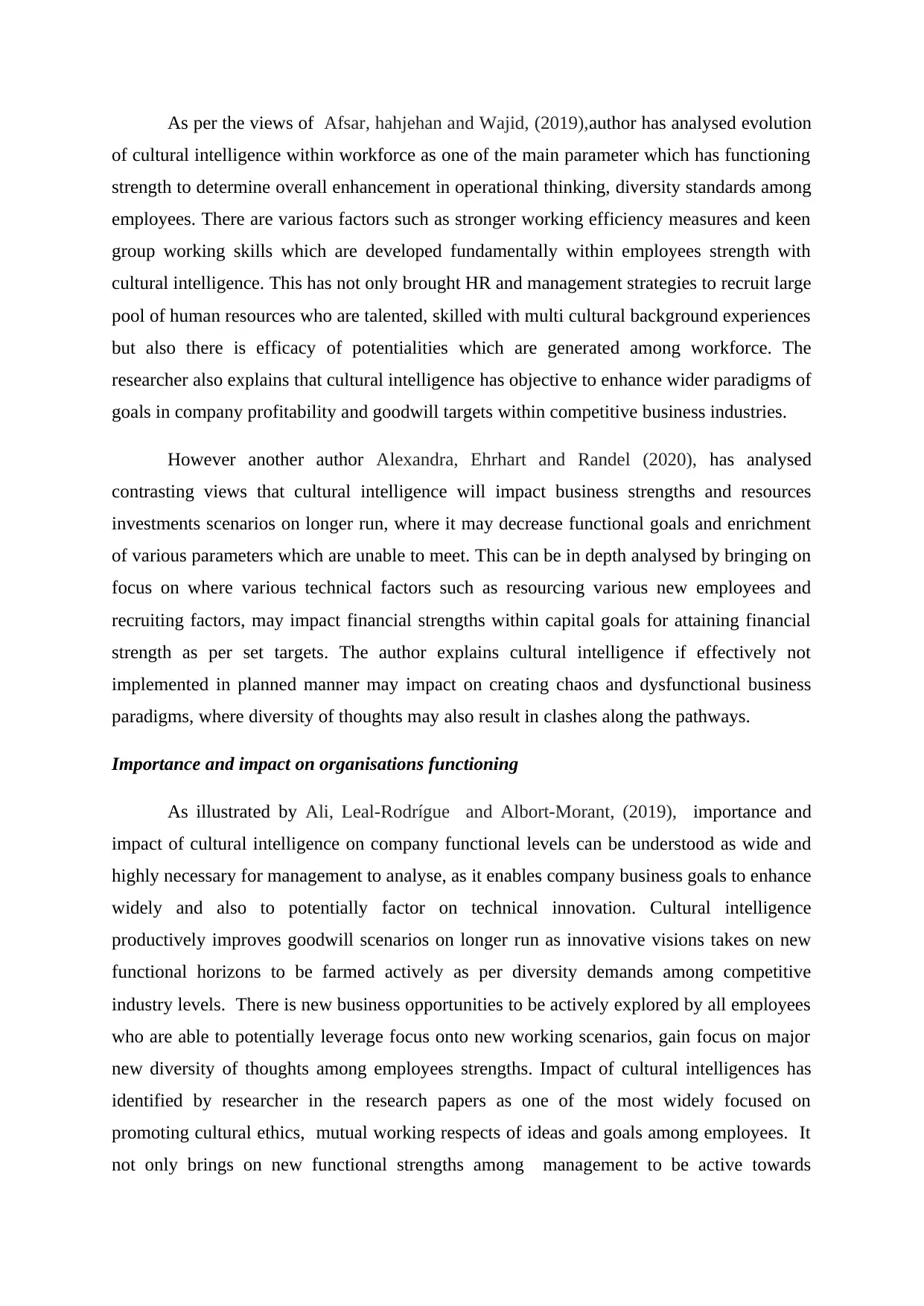
As per the views of Afsar, hahjehan and Wajid, (2019),author has analysed evolution
of cultural intelligence within workforce as one of the main parameter which has functioning
strength to determine overall enhancement in operational thinking, diversity standards among
employees. There are various factors such as stronger working efficiency measures and keen
group working skills which are developed fundamentally within employees strength with
cultural intelligence. This has not only brought HR and management strategies to recruit large
pool of human resources who are talented, skilled with multi cultural background experiences
but also there is efficacy of potentialities which are generated among workforce. The
researcher also explains that cultural intelligence has objective to enhance wider paradigms of
goals in company profitability and goodwill targets within competitive business industries.
However another author Alexandra, Ehrhart and Randel (2020), has analysed
contrasting views that cultural intelligence will impact business strengths and resources
investments scenarios on longer run, where it may decrease functional goals and enrichment
of various parameters which are unable to meet. This can be in depth analysed by bringing on
focus on where various technical factors such as resourcing various new employees and
recruiting factors, may impact financial strengths within capital goals for attaining financial
strength as per set targets. The author explains cultural intelligence if effectively not
implemented in planned manner may impact on creating chaos and dysfunctional business
paradigms, where diversity of thoughts may also result in clashes along the pathways.
Importance and impact on organisations functioning
As illustrated by Ali, Leal-Rodrígue and Albort-Morant, (2019), importance and
impact of cultural intelligence on company functional levels can be understood as wide and
highly necessary for management to analyse, as it enables company business goals to enhance
widely and also to potentially factor on technical innovation. Cultural intelligence
productively improves goodwill scenarios on longer run as innovative visions takes on new
functional horizons to be farmed actively as per diversity demands among competitive
industry levels. There is new business opportunities to be actively explored by all employees
who are able to potentially leverage focus onto new working scenarios, gain focus on major
new diversity of thoughts among employees strengths. Impact of cultural intelligences has
identified by researcher in the research papers as one of the most widely focused on
promoting cultural ethics, mutual working respects of ideas and goals among employees. It
not only brings on new functional strengths among management to be active towards
of cultural intelligence within workforce as one of the main parameter which has functioning
strength to determine overall enhancement in operational thinking, diversity standards among
employees. There are various factors such as stronger working efficiency measures and keen
group working skills which are developed fundamentally within employees strength with
cultural intelligence. This has not only brought HR and management strategies to recruit large
pool of human resources who are talented, skilled with multi cultural background experiences
but also there is efficacy of potentialities which are generated among workforce. The
researcher also explains that cultural intelligence has objective to enhance wider paradigms of
goals in company profitability and goodwill targets within competitive business industries.
However another author Alexandra, Ehrhart and Randel (2020), has analysed
contrasting views that cultural intelligence will impact business strengths and resources
investments scenarios on longer run, where it may decrease functional goals and enrichment
of various parameters which are unable to meet. This can be in depth analysed by bringing on
focus on where various technical factors such as resourcing various new employees and
recruiting factors, may impact financial strengths within capital goals for attaining financial
strength as per set targets. The author explains cultural intelligence if effectively not
implemented in planned manner may impact on creating chaos and dysfunctional business
paradigms, where diversity of thoughts may also result in clashes along the pathways.
Importance and impact on organisations functioning
As illustrated by Ali, Leal-Rodrígue and Albort-Morant, (2019), importance and
impact of cultural intelligence on company functional levels can be understood as wide and
highly necessary for management to analyse, as it enables company business goals to enhance
widely and also to potentially factor on technical innovation. Cultural intelligence
productively improves goodwill scenarios on longer run as innovative visions takes on new
functional horizons to be farmed actively as per diversity demands among competitive
industry levels. There is new business opportunities to be actively explored by all employees
who are able to potentially leverage focus onto new working scenarios, gain focus on major
new diversity of thoughts among employees strengths. Impact of cultural intelligences has
identified by researcher in the research papers as one of the most widely focused on
promoting cultural ethics, mutual working respects of ideas and goals among employees. It
not only brings on new functional strengths among management to be active towards
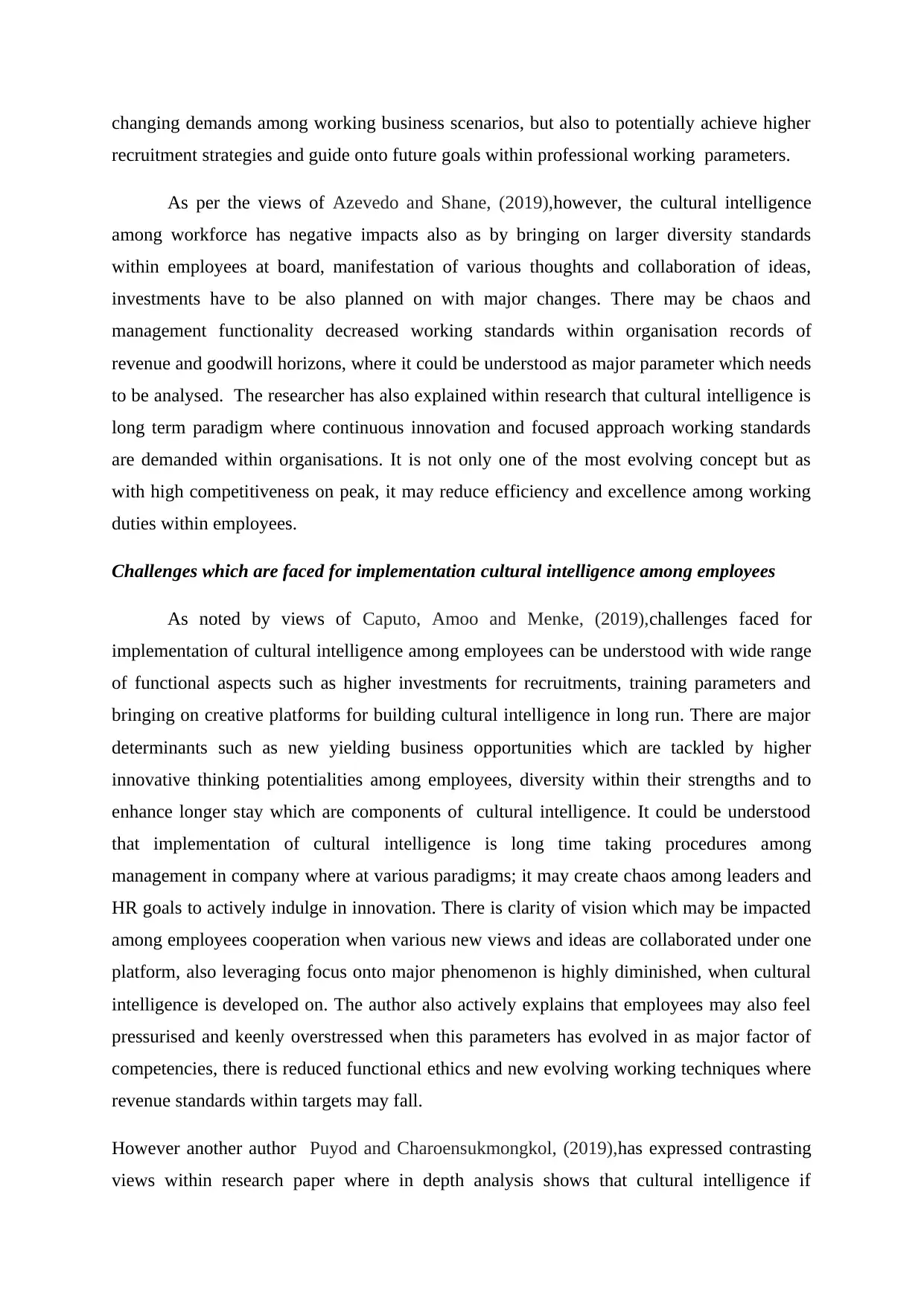
changing demands among working business scenarios, but also to potentially achieve higher
recruitment strategies and guide onto future goals within professional working parameters.
As per the views of Azevedo and Shane, (2019),however, the cultural intelligence
among workforce has negative impacts also as by bringing on larger diversity standards
within employees at board, manifestation of various thoughts and collaboration of ideas,
investments have to be also planned on with major changes. There may be chaos and
management functionality decreased working standards within organisation records of
revenue and goodwill horizons, where it could be understood as major parameter which needs
to be analysed. The researcher has also explained within research that cultural intelligence is
long term paradigm where continuous innovation and focused approach working standards
are demanded within organisations. It is not only one of the most evolving concept but as
with high competitiveness on peak, it may reduce efficiency and excellence among working
duties within employees.
Challenges which are faced for implementation cultural intelligence among employees
As noted by views of Caputo, Amoo and Menke, (2019),challenges faced for
implementation of cultural intelligence among employees can be understood with wide range
of functional aspects such as higher investments for recruitments, training parameters and
bringing on creative platforms for building cultural intelligence in long run. There are major
determinants such as new yielding business opportunities which are tackled by higher
innovative thinking potentialities among employees, diversity within their strengths and to
enhance longer stay which are components of cultural intelligence. It could be understood
that implementation of cultural intelligence is long time taking procedures among
management in company where at various paradigms; it may create chaos among leaders and
HR goals to actively indulge in innovation. There is clarity of vision which may be impacted
among employees cooperation when various new views and ideas are collaborated under one
platform, also leveraging focus onto major phenomenon is highly diminished, when cultural
intelligence is developed on. The author also actively explains that employees may also feel
pressurised and keenly overstressed when this parameters has evolved in as major factor of
competencies, there is reduced functional ethics and new evolving working techniques where
revenue standards within targets may fall.
However another author Puyod and Charoensukmongkol, (2019),has expressed contrasting
views within research paper where in depth analysis shows that cultural intelligence if
recruitment strategies and guide onto future goals within professional working parameters.
As per the views of Azevedo and Shane, (2019),however, the cultural intelligence
among workforce has negative impacts also as by bringing on larger diversity standards
within employees at board, manifestation of various thoughts and collaboration of ideas,
investments have to be also planned on with major changes. There may be chaos and
management functionality decreased working standards within organisation records of
revenue and goodwill horizons, where it could be understood as major parameter which needs
to be analysed. The researcher has also explained within research that cultural intelligence is
long term paradigm where continuous innovation and focused approach working standards
are demanded within organisations. It is not only one of the most evolving concept but as
with high competitiveness on peak, it may reduce efficiency and excellence among working
duties within employees.
Challenges which are faced for implementation cultural intelligence among employees
As noted by views of Caputo, Amoo and Menke, (2019),challenges faced for
implementation of cultural intelligence among employees can be understood with wide range
of functional aspects such as higher investments for recruitments, training parameters and
bringing on creative platforms for building cultural intelligence in long run. There are major
determinants such as new yielding business opportunities which are tackled by higher
innovative thinking potentialities among employees, diversity within their strengths and to
enhance longer stay which are components of cultural intelligence. It could be understood
that implementation of cultural intelligence is long time taking procedures among
management in company where at various paradigms; it may create chaos among leaders and
HR goals to actively indulge in innovation. There is clarity of vision which may be impacted
among employees cooperation when various new views and ideas are collaborated under one
platform, also leveraging focus onto major phenomenon is highly diminished, when cultural
intelligence is developed on. The author also actively explains that employees may also feel
pressurised and keenly overstressed when this parameters has evolved in as major factor of
competencies, there is reduced functional ethics and new evolving working techniques where
revenue standards within targets may fall.
However another author Puyod and Charoensukmongkol, (2019),has expressed contrasting
views within research paper where in depth analysis shows that cultural intelligence if
⊘ This is a preview!⊘
Do you want full access?
Subscribe today to unlock all pages.

Trusted by 1+ million students worldwide
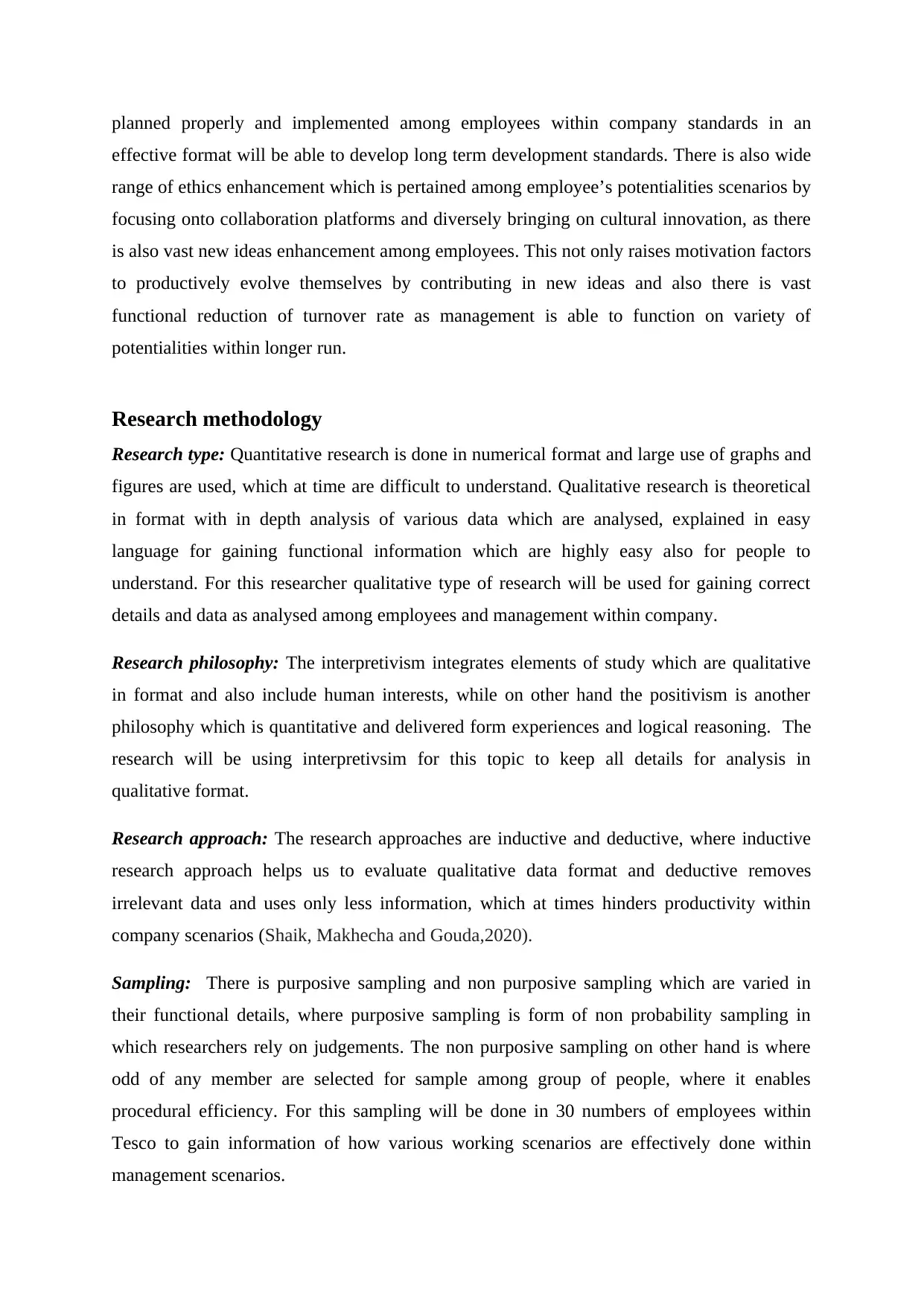
planned properly and implemented among employees within company standards in an
effective format will be able to develop long term development standards. There is also wide
range of ethics enhancement which is pertained among employee’s potentialities scenarios by
focusing onto collaboration platforms and diversely bringing on cultural innovation, as there
is also vast new ideas enhancement among employees. This not only raises motivation factors
to productively evolve themselves by contributing in new ideas and also there is vast
functional reduction of turnover rate as management is able to function on variety of
potentialities within longer run.
Research methodology
Research type: Quantitative research is done in numerical format and large use of graphs and
figures are used, which at time are difficult to understand. Qualitative research is theoretical
in format with in depth analysis of various data which are analysed, explained in easy
language for gaining functional information which are highly easy also for people to
understand. For this researcher qualitative type of research will be used for gaining correct
details and data as analysed among employees and management within company.
Research philosophy: The interpretivism integrates elements of study which are qualitative
in format and also include human interests, while on other hand the positivism is another
philosophy which is quantitative and delivered form experiences and logical reasoning. The
research will be using interpretivsim for this topic to keep all details for analysis in
qualitative format.
Research approach: The research approaches are inductive and deductive, where inductive
research approach helps us to evaluate qualitative data format and deductive removes
irrelevant data and uses only less information, which at times hinders productivity within
company scenarios (Shaik, Makhecha and Gouda,2020).
Sampling: There is purposive sampling and non purposive sampling which are varied in
their functional details, where purposive sampling is form of non probability sampling in
which researchers rely on judgements. The non purposive sampling on other hand is where
odd of any member are selected for sample among group of people, where it enables
procedural efficiency. For this sampling will be done in 30 numbers of employees within
Tesco to gain information of how various working scenarios are effectively done within
management scenarios.
effective format will be able to develop long term development standards. There is also wide
range of ethics enhancement which is pertained among employee’s potentialities scenarios by
focusing onto collaboration platforms and diversely bringing on cultural innovation, as there
is also vast new ideas enhancement among employees. This not only raises motivation factors
to productively evolve themselves by contributing in new ideas and also there is vast
functional reduction of turnover rate as management is able to function on variety of
potentialities within longer run.
Research methodology
Research type: Quantitative research is done in numerical format and large use of graphs and
figures are used, which at time are difficult to understand. Qualitative research is theoretical
in format with in depth analysis of various data which are analysed, explained in easy
language for gaining functional information which are highly easy also for people to
understand. For this researcher qualitative type of research will be used for gaining correct
details and data as analysed among employees and management within company.
Research philosophy: The interpretivism integrates elements of study which are qualitative
in format and also include human interests, while on other hand the positivism is another
philosophy which is quantitative and delivered form experiences and logical reasoning. The
research will be using interpretivsim for this topic to keep all details for analysis in
qualitative format.
Research approach: The research approaches are inductive and deductive, where inductive
research approach helps us to evaluate qualitative data format and deductive removes
irrelevant data and uses only less information, which at times hinders productivity within
company scenarios (Shaik, Makhecha and Gouda,2020).
Sampling: There is purposive sampling and non purposive sampling which are varied in
their functional details, where purposive sampling is form of non probability sampling in
which researchers rely on judgements. The non purposive sampling on other hand is where
odd of any member are selected for sample among group of people, where it enables
procedural efficiency. For this sampling will be done in 30 numbers of employees within
Tesco to gain information of how various working scenarios are effectively done within
management scenarios.
Paraphrase This Document
Need a fresh take? Get an instant paraphrase of this document with our AI Paraphraser
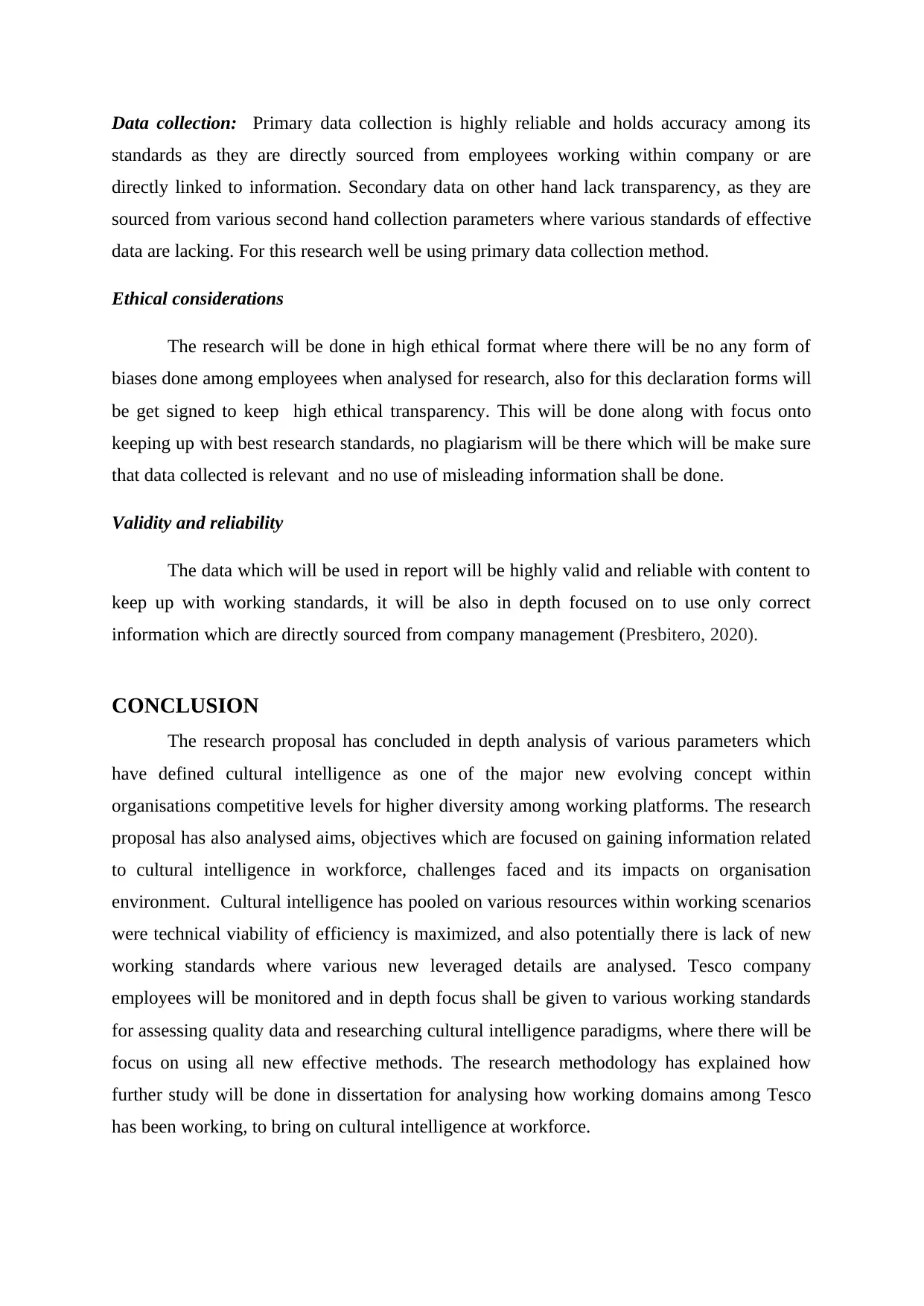
Data collection: Primary data collection is highly reliable and holds accuracy among its
standards as they are directly sourced from employees working within company or are
directly linked to information. Secondary data on other hand lack transparency, as they are
sourced from various second hand collection parameters where various standards of effective
data are lacking. For this research well be using primary data collection method.
Ethical considerations
The research will be done in high ethical format where there will be no any form of
biases done among employees when analysed for research, also for this declaration forms will
be get signed to keep high ethical transparency. This will be done along with focus onto
keeping up with best research standards, no plagiarism will be there which will be make sure
that data collected is relevant and no use of misleading information shall be done.
Validity and reliability
The data which will be used in report will be highly valid and reliable with content to
keep up with working standards, it will be also in depth focused on to use only correct
information which are directly sourced from company management (Presbitero, 2020).
CONCLUSION
The research proposal has concluded in depth analysis of various parameters which
have defined cultural intelligence as one of the major new evolving concept within
organisations competitive levels for higher diversity among working platforms. The research
proposal has also analysed aims, objectives which are focused on gaining information related
to cultural intelligence in workforce, challenges faced and its impacts on organisation
environment. Cultural intelligence has pooled on various resources within working scenarios
were technical viability of efficiency is maximized, and also potentially there is lack of new
working standards where various new leveraged details are analysed. Tesco company
employees will be monitored and in depth focus shall be given to various working standards
for assessing quality data and researching cultural intelligence paradigms, where there will be
focus on using all new effective methods. The research methodology has explained how
further study will be done in dissertation for analysing how working domains among Tesco
has been working, to bring on cultural intelligence at workforce.
standards as they are directly sourced from employees working within company or are
directly linked to information. Secondary data on other hand lack transparency, as they are
sourced from various second hand collection parameters where various standards of effective
data are lacking. For this research well be using primary data collection method.
Ethical considerations
The research will be done in high ethical format where there will be no any form of
biases done among employees when analysed for research, also for this declaration forms will
be get signed to keep high ethical transparency. This will be done along with focus onto
keeping up with best research standards, no plagiarism will be there which will be make sure
that data collected is relevant and no use of misleading information shall be done.
Validity and reliability
The data which will be used in report will be highly valid and reliable with content to
keep up with working standards, it will be also in depth focused on to use only correct
information which are directly sourced from company management (Presbitero, 2020).
CONCLUSION
The research proposal has concluded in depth analysis of various parameters which
have defined cultural intelligence as one of the major new evolving concept within
organisations competitive levels for higher diversity among working platforms. The research
proposal has also analysed aims, objectives which are focused on gaining information related
to cultural intelligence in workforce, challenges faced and its impacts on organisation
environment. Cultural intelligence has pooled on various resources within working scenarios
were technical viability of efficiency is maximized, and also potentially there is lack of new
working standards where various new leveraged details are analysed. Tesco company
employees will be monitored and in depth focus shall be given to various working standards
for assessing quality data and researching cultural intelligence paradigms, where there will be
focus on using all new effective methods. The research methodology has explained how
further study will be done in dissertation for analysing how working domains among Tesco
has been working, to bring on cultural intelligence at workforce.
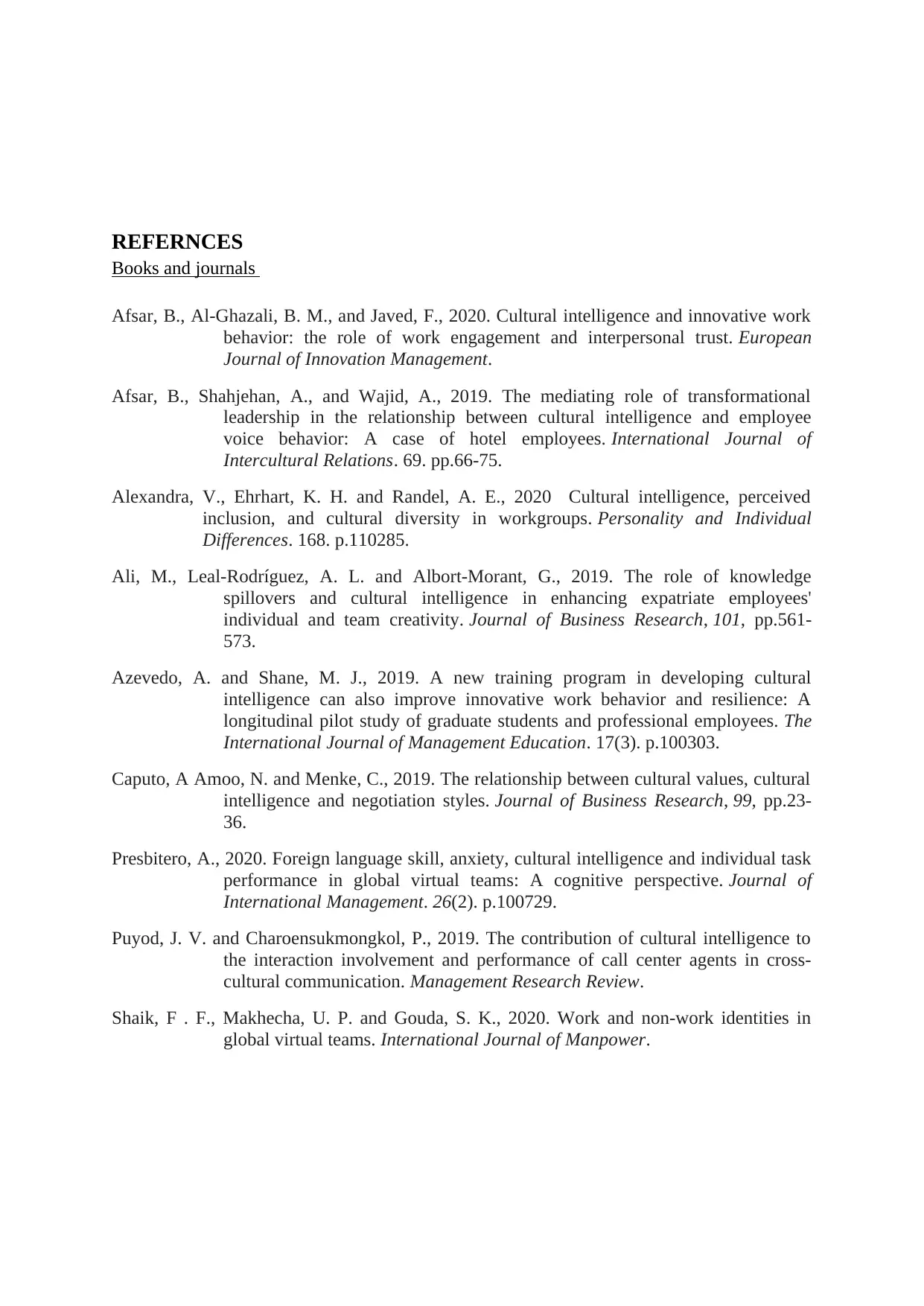
REFERNCES
Books and journals
Afsar, B., Al-Ghazali, B. M., and Javed, F., 2020. Cultural intelligence and innovative work
behavior: the role of work engagement and interpersonal trust. European
Journal of Innovation Management.
Afsar, B., Shahjehan, A., and Wajid, A., 2019. The mediating role of transformational
leadership in the relationship between cultural intelligence and employee
voice behavior: A case of hotel employees. International Journal of
Intercultural Relations. 69. pp.66-75.
Alexandra, V., Ehrhart, K. H. and Randel, A. E., 2020 Cultural intelligence, perceived
inclusion, and cultural diversity in workgroups. Personality and Individual
Differences. 168. p.110285.
Ali, M., Leal-Rodríguez, A. L. and Albort-Morant, G., 2019. The role of knowledge
spillovers and cultural intelligence in enhancing expatriate employees'
individual and team creativity. Journal of Business Research, 101, pp.561-
573.
Azevedo, A. and Shane, M. J., 2019. A new training program in developing cultural
intelligence can also improve innovative work behavior and resilience: A
longitudinal pilot study of graduate students and professional employees. The
International Journal of Management Education. 17(3). p.100303.
Caputo, A Amoo, N. and Menke, C., 2019. The relationship between cultural values, cultural
intelligence and negotiation styles. Journal of Business Research, 99, pp.23-
36.
Presbitero, A., 2020. Foreign language skill, anxiety, cultural intelligence and individual task
performance in global virtual teams: A cognitive perspective. Journal of
International Management. 26(2). p.100729.
Puyod, J. V. and Charoensukmongkol, P., 2019. The contribution of cultural intelligence to
the interaction involvement and performance of call center agents in cross-
cultural communication. Management Research Review.
Shaik, F . F., Makhecha, U. P. and Gouda, S. K., 2020. Work and non-work identities in
global virtual teams. International Journal of Manpower.
Books and journals
Afsar, B., Al-Ghazali, B. M., and Javed, F., 2020. Cultural intelligence and innovative work
behavior: the role of work engagement and interpersonal trust. European
Journal of Innovation Management.
Afsar, B., Shahjehan, A., and Wajid, A., 2019. The mediating role of transformational
leadership in the relationship between cultural intelligence and employee
voice behavior: A case of hotel employees. International Journal of
Intercultural Relations. 69. pp.66-75.
Alexandra, V., Ehrhart, K. H. and Randel, A. E., 2020 Cultural intelligence, perceived
inclusion, and cultural diversity in workgroups. Personality and Individual
Differences. 168. p.110285.
Ali, M., Leal-Rodríguez, A. L. and Albort-Morant, G., 2019. The role of knowledge
spillovers and cultural intelligence in enhancing expatriate employees'
individual and team creativity. Journal of Business Research, 101, pp.561-
573.
Azevedo, A. and Shane, M. J., 2019. A new training program in developing cultural
intelligence can also improve innovative work behavior and resilience: A
longitudinal pilot study of graduate students and professional employees. The
International Journal of Management Education. 17(3). p.100303.
Caputo, A Amoo, N. and Menke, C., 2019. The relationship between cultural values, cultural
intelligence and negotiation styles. Journal of Business Research, 99, pp.23-
36.
Presbitero, A., 2020. Foreign language skill, anxiety, cultural intelligence and individual task
performance in global virtual teams: A cognitive perspective. Journal of
International Management. 26(2). p.100729.
Puyod, J. V. and Charoensukmongkol, P., 2019. The contribution of cultural intelligence to
the interaction involvement and performance of call center agents in cross-
cultural communication. Management Research Review.
Shaik, F . F., Makhecha, U. P. and Gouda, S. K., 2020. Work and non-work identities in
global virtual teams. International Journal of Manpower.
⊘ This is a preview!⊘
Do you want full access?
Subscribe today to unlock all pages.

Trusted by 1+ million students worldwide
1 out of 9
Related Documents
Your All-in-One AI-Powered Toolkit for Academic Success.
+13062052269
info@desklib.com
Available 24*7 on WhatsApp / Email
![[object Object]](/_next/static/media/star-bottom.7253800d.svg)
Unlock your academic potential
Copyright © 2020–2026 A2Z Services. All Rights Reserved. Developed and managed by ZUCOL.





